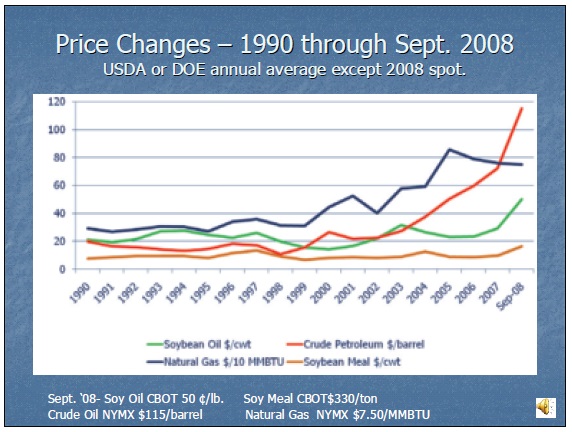How green is green?
Dr. Robert M. Gresham, Contributing Editor | TLT Lubrication Fundamentals April 2009
Ready to start substituting bio-based products for petroleum? Maybe we should take a look at the math first.

www.canstockphoto.com
KEY CONCEPTS
• Economic as well as political considerations must be factored into the equation before we begin substituting bio-based fuels and lubricants for their petroleum-based counterparts.
• Genetic engineering and refining subtleties are needed to make bio-based products a better and more economical substitute.
• Even a simple concept like renewability is a relative term and must be considered on a case-by-case basis.
Last fall I attended a conference hosted by the American Oil Chemists Society (AOCS). Further, I helped Dr. Sevim Erhan, chair of STLE’s Environmentally Friendly Fluids Technical Committee, create a technical session at the conference titled Applications for Bio-based Lubricants. This was a very interesting and informative conference for me and really helped to put a lot of things into perspective.
In the last few years, our society has been inundated with all manner of hype related to saving the environment, global warming, becoming free from the shackles of Mideast oil and the virtues of burning our food for fuel. As a scientifically trained individual, I’m always leery when these presumably laudable emanations reach the level of extreme religious fervor. Even the gentlest questioning, let alone doubt, results in the most harsh of recrimination akin to advocating the beheading of newborns. OK, that is a little long on the hyperbole, but you get the idea.
For certain, the goal of preserving the beauty of our environment is just common sense. Global warming as a result of man’s activities, probably better described as thermal pollution, takes place, certainly, but what are the true consequences? What is the amount or proportion of warming from manmade sources vs. those that occur naturally? What is the earth’s ability to ameliorate these forces?
I don’t think we actually know the answer to any of these questions, beyond localized anecdotal events, which in and of themselves are bad but perhaps not from a global ecological perspective. By the way, whatever happened to the growing ozone hole that was to have already caused me to have died of skin cancer? Becoming free of Mideast oil is easy enough but costly. We now know that there are plenty of oil reserves around the world and under the sea but all cost much more than Mideast oil that is cheap and easy to get from the ground and inexpensive to refine relative to other sources.
This leads to the issue at hand—what is the impact and viability of bio-based sources of energy and the replacement of products derived from crude oil? As the expression goes, follow the money. At the recent AOCS conference, there was a presentation by Jim Martin from Omnitech about a survey by the United Soybean Board that grounds us in reality. He presented, in the chart shown in Figure 1, the prices of crude oil and soybeans as of Sept. 30, 2008.

Figure 1.
As Jim Martin put it, “Vegetable oil and even soybean meal has increased in price, but when you look back even four years to when 100 pounds of soybean oil cost more than a barrel of oil, it is easy to see that we are in a whole new ballgame today.” Thus, four years ago and in the succeeding years, aside from the political ramifications, there was considerable reason to push research into novel syntheses for lubricating oils based on soybean oils. And, indeed, this was the case.
As showcased at the AOCS conference, considerable high-quality research indicates that, for many applications, soy-based oils, with a little genetic engineering, suitable refining and the addition of suitable additives, could be successfully used in place of many conventional crude oil-based products. These advances and those of others lead to high yields of C18 molecules like the fatty acids: Stearic (no double bonds), Oleic (one double bond), Linoleic (two double bonds) and Linolenic (three double bonds).
Remember, for food we like polyunsaturates or, in other words, lots of double bonds because that makes them digestible and therefore easy on the body. However, for lubricant applications, it is quite the opposite. We like polysaturates or, in other words, no double bonds. This gives the molecule higher temperature stability, higher chemical resistance, and, oh yes, less biodegradability.
So the problem is twofold. If crude oil prices are high, then using renewable source materials like soybeans makes financial sense as long as we genetically engineer and refi ne these materials to get rid of the reactive sites, like double bonds, making them much more nearly like crude oil—so they work as lubricants. Or if crude oil prices are low, as they are now at the time of writing (from well over $100 a barrel in September to $40 a barrel today), renewable source materials, like soybeans, might make sense for political considerations, such as to be less dependent on certain foreign sources of crude oil, but certainly not for normal economic reasons.
Presumably, for some, I’ve slipped another concept in as well in addition to following the money. If we start with sources like soybeans, corn, biomass or whatever, we are talking about so-called “renewable-sourced” materials. Recognize that even renewable is a very relative term (we are renewing crude oil every day—it just takes centuries vs. crops that renew annually, topsoil not withstanding).
However, for these sources to actually work in industrial applications, we have to either genetically engineer or refi ne out the inherent biodegradability or environmentally friendly nature of the oils so that they will actually work as industrial lubricants, thus their real value is their relative renewability. But is that rapid renewability sustainable? That becomes the real question, for without it we have only moved the problem from one arena to another.
Once again, in the now immortal words of the new bard of our times, Kermit the Frog, “It isn’t easy being green.”

Bob Gresham is STLE’s director of professional development. You can reach him at rgresham@stle.org.